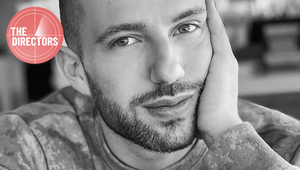
Trends, Traits and Technology Up-and-Coming Producers Must Embrace

Ralph Miccio, partner and head of post production at Good Company, is a lifelong New Yorker with a career journey as dynamic as the city itself.
Starting out as a video editor in the mid-90s, Ralph took the road less travelled – one that led him through a whirlwind of diverse roles, from journalist at the iconic Ego Trip magazine to tour manager for world-class DJs, record label owner/A&R, post facility manager, and even a NYC yellow cab driver.
For the past 13 years, Ralph has channelled this rich tapestry of experiences into building and leading Good Company’s post-production division, delivering top-tier work for the biggest brands, agencies, and artists in the game.
His unique perspective and relentless drive keep Good Company ahead of the curve – and the industry takes notice.
LBB> What advice would you give to any aspiring producers or content creators hoping to make the jump into production?
Ralph> Be patient with your career trajectory, and build your peer network. Your peers in college or just entering the work force are going to be the lead artists, EPs and company owners of the future.
LBB> What skills or emerging areas would you advise aspiring producers to learn about and educate themselves about?
Ralph> AI. It’s here to stay, whether we like it or not.
LBB> What was the biggest lesson you learned when you were starting out in production – and why has that stayed with you?
Ralph> Murphy’s Law is real. Your render will definitely crash at the eleventh hour of your delivery:)
Providing real-time solutions to navigate your project’s unexpected challenges is probably the most important producing skill to develop, and the only way to improve that skill is through experience.
LBB> When it comes to broadening access to production and improving diversity and inclusion what are your team doing to address this?
Ralph> Early on in our company’s history, we made a conscious effort to surround ourselves with a diverse team. We produce content and live experiences that shape the cultural landscape, so our team must reflect the diversity of that landscape. We continually make an effort to ensure that we’re bringing in talent from a variety of backgrounds.
LBB> And why is it an important issue for the production community to address
Ralph> Representation matters. The stories we tell shape culture, and having a diverse team allows for a broader range of stories, ideas, and approaches. It helps make the work more authentic and relatable to a wider audience.
LBB> There are young people getting into production who maybe don’t see the line between professional production and the creator economy, and that may well also be the shape of things to come. What are your thoughts about that? Is there a tension between more formalised production and the ‘creator economy’, or do the two feed into each other?
Ralph> You can’t fight the creator economy; but I think what we’re seeing is that both the formal production world and the creator economy feed into each other. Many creators are becoming the next wave of professional producers.
The skills they learn, like creating content with a quick turnaround, are transferable to more formalised production roles.
LBB> If you compare your role to the role of the heads of TV/heads of production/executive producers when you first joined the industry, what do you think are the most striking or interesting changes (and what surprising things have stayed the same)?
Ralph> The speed at which decisions are made. The digital age has brought new tools and workflows that allow for faster turnarounds. However, what hasn’t changed is the importance of building strong relationships.
Whether you’re working on a big-budget commercial or a small social media video, the key to success still lies in strong communication, team collaboration, and problem-solving.
LBB> When it comes to educating producers how does your agency like to approach this?
Ralph> I think the best thing an up-and-coming producer can do is work under as many senior producers and EPs as they can. Observing and understanding the communication and dynamics between all parties involved in a project (clients, vendors, artists, etc) is key.
While tech skills are certainly important, the ability to manage people, keep things organised, and handle high-pressure situations is something that’s learned best on the job, through experience.
LBB> It seems that there’s an emphasis on speed and volume when it comes to content – but where is the space for up and coming producers to learn about (and learn to appreciate) craft?
Ralph> The best place for an up-and-coming producer to learn and appreciate the craft is by working full-time with a company that handles a variety of projects simultaneously. At Good Company, we’re fortunate to work on long-form content, live experiences, commercials, and music videos.
This gives our producers the opportunity to see and appreciate the full scope of what it means to produce quality work across different mediums.
LBB> On the other side of the equation, what’s the key to retaining expertise and helping people who have been working in production for decades to develop new skills?
Ralph> The post production world evolves constantly, and even seasoned professionals need to embrace new technology and tools. Whether it’s through training, mentoring, or just staying curious, it’s essential to keep evolving and exploring new ways to approach challenges.
LBB> Clearly there is so much change, but what are the personality traits and skills that will always be in demand from producers?
Ralph> Regardless of how the industry changes, some traits will always be in demand: adaptability, problem-solving, and excellent communication. Being able to think on your feet, stay calm under pressure, and to manage different people and moving parts effectively is critical. The best producers are always looking for solutions, not just identifying problems.















